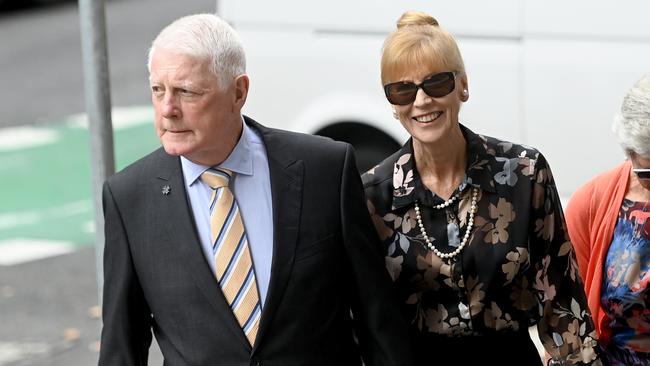No ‘nefarious’ cover up in Ben Roberts-Smith case: soldier’s lawyers
Evidence relied upon in throwing out the former SAS soldier’s defamation case against Nine newspapers at times contradicted official military documentation, an appeal court has heard.

The judge who oversaw Ben Roberts-Smith’s high-stakes defamation action against Nine newspapers failed to consider inconsistencies between witness accounts, and gave too much weight to testimony that contradicted official military documentation, an appeal court has heard.
The Full Court of the Federal Court on Monday began hearing Roberts-Smith’s two week appeal against the media organisation, after Justice Anthony Besanko last year found that he was involved in the unlawful killings of four prisoners in Afghanistan.
The Victoria Cross recipient, who has consistently denied the allegations, is arguing Justice Besanko erred in his findings regarding the six articles in The Sydney Morning Herald, The Age and The Canberra Times, and has asked the court to set aside the judgement.
Leading appellate silk Bret Walker SC on Monday argued Justice Besanko made an “error” when it came to considering witness accounts during an incident that occurred at an Afghan compound known as Whiskey 108.
The newspapers during the trial alleged that two Afghan men were killed at Whiskey 108 after being discovered hiding in a tunnel. Nine claimed an elderly man was shot by a “rookie” trooper on the order of Roberts-Smith, who himself killed the other man who had a prosthetic leg.
While some military witnesses during the trial, such as unnamed Person 43, claimed the operations occurred as the newspapers alleged, others, such as unnamed Person 81, did not recall the engagement.
Mr Walker on Monday told the court Justice Besanko failed to properly consider the “variability” in evidence in regards to the Whiskey 108 event, which “detract from the reliability of overall picture between witnesses, some of whom, claim to have seen some things and others not.”
Further, Mr Walker said Justice Besanko came to a conclusion that was “not supported” by a “consistent kind” of evidence.
“Put it another way more bluntly, you can’t dismiss evidence simply because you think other evidence is correct, unless you can give a better reason than that,” he said.
Mr Walker told appeal Justices Nye Perram, Anna Katzmann and Geoffrey Kennett that Justice Besanko’s findings in relation to the unlawful killings at Whiskey 108 was based on the evidence of military witnesses that contradicted an official patrol document.
He told the bench that Justice Besanko had not explained why he preferred the testimony of military witnesses called by the newspapers over documents created closer in time to the incident, and claimed the judge had failed to explain how the document could have been “nefariously corrupted” to cover up the murders.
“You obviously don’t infer from a discrepancy between a later purported recollection and a contemporaneous record that the record must be wrong or must have been corrupted,” Mr Walker said. “That would be absurd and unfair and purely speculative.”

In opening submissions on Monday, Mr Walker told the bench that the difference between “civilised” and uncivilised killing must be at the centre of the matter.
“The difference between killing that occurs in the course of duty permitted by a civilised system of law and killing which is not so authorised and is therefore not excused by the activities of war,” he said.
“That difference is of course at the heart of the case.”
Mr Walker also stressed the importance of determining whether the evidence presented in the original trial was “cogent”.
“It is important to note that the question is not which side’s witnesses or argument was preferred, but rather, whether the material marshalled by way of evidence and argument in support of such serious allegations was sufficiently cogent ... to justify the making of the final adjudication in favour of those allegations,” he said.
At one point during Mr Walker’s opening submissions, Justice Katzmann interrupted to ask whether the court had spent “the best part of three quarters of an hour being lectured about principles of which we’re all very aware.”
While not present in court when the original decision was handed down in court last June, Roberts-Smith arrived at the Federal Court early on Monday with the support of his parents, Sue and Len Roberts.
The hearing will continue on Tuesday.







